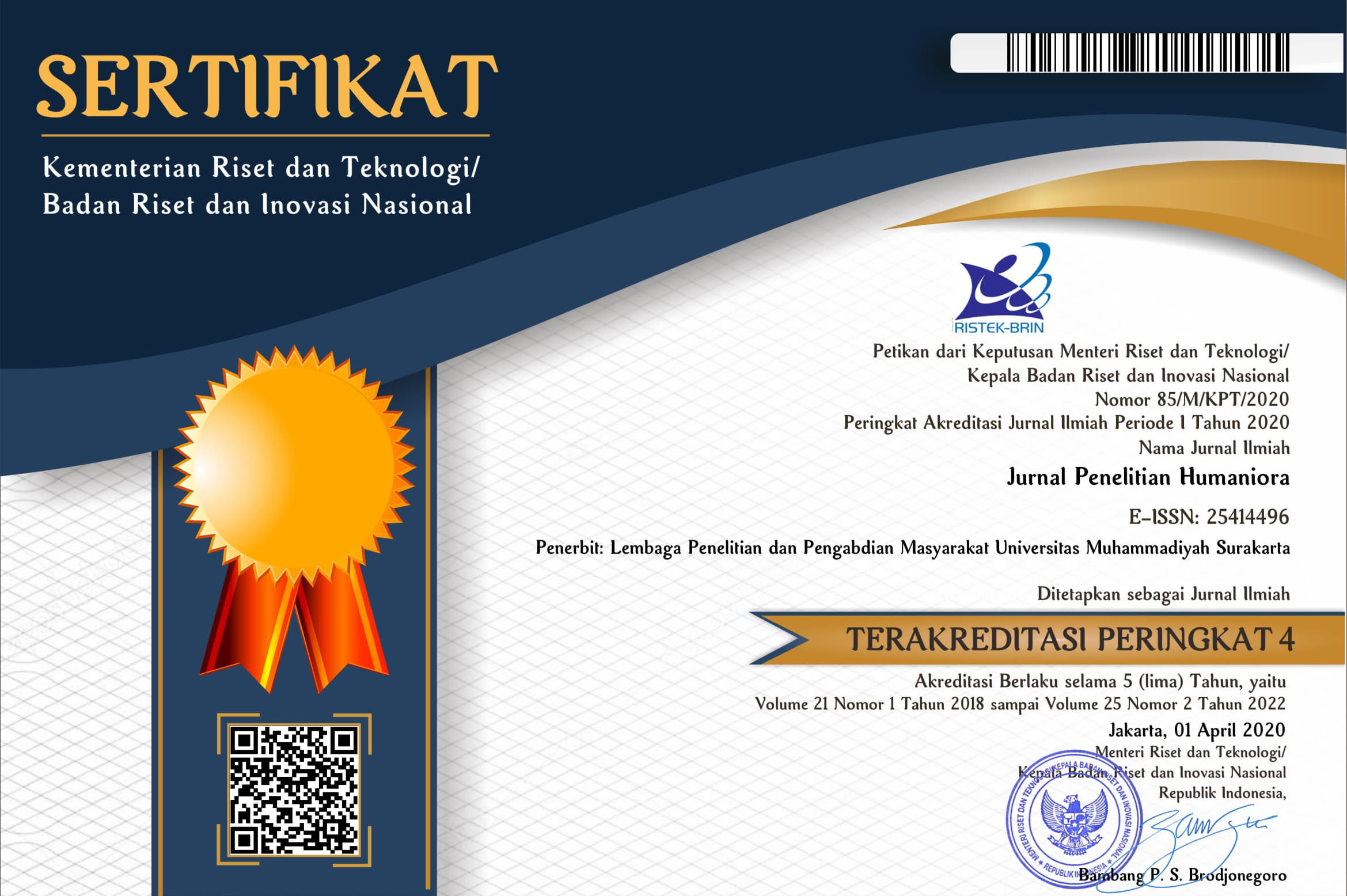EFEKTIFITAS PENGGUNAAN METODE DISCOVERY LEARNING TERHADAP HASIL BELAJAR MENULIS KALIMAT BAHASA JEPANG
Megawati Adinda Rizkiningrum(1), Wilda Liona Suri(2*), Erliyani Erliyani(3)(1) Sekolah Pascasarjana Universitas Muhammadiyah Prof. DR. HAMKA
(2) Sekolah Pascasarjana Universitas Muhammadiyah Prof. DR. HAMKA
(3) Sekolah Pascasarjana Universitas Muhammadiyah Prof. DR. HAMKA
(*) Corresponding Author
Abstract
Keywords
Full Text:
PDFReferences
Akanbi, A., & Kolawole, C. (2014). Effects of Guided-Discovey and Self-Learning Strategies on Senior Secondary School Student's Achievement in Biology. Journal of Education and Leadership Development, 6(1), 19-42.
Arikunto, S. (2006). Prosedur Penelitian Suatu Pendekatan Praktik Edisi Revisi VI. Jakarta: Rineka Cipta.
Balim, A. G. (2009). The Effects of Discovery Learning on Students Success and Inquiry Learn-ing Skills. Eurasian Journal of Educational Research, 9(35), 1-20.
Danasasmita, W. (2009). Metodologi Pembelajaran Bahasa Jepang. Bandung: Rizqi Press.
Farhatani, I. (2014). Peningkatan Kompetensi Mata Pelajaran Dasar dan Pengukuran Listrik Siswa Kelas X Program Keahlian Teknik Instalasi Tenaga Listrik di SMK Muhammadi-yah 1 Klaten Utara dengan Metode Discovery Learning (Skripsi). Yogyakarta: Universi-tas Negeri Yogyakarta.
Huurun’ien, K. I., Efendi, A., & Tamrin, A. G. (2017). Efektivitas Penggunaan E-Learning Ber-basis Schoology dengan Menggunakan Model Discovery Learning terhadap Prestasi Bela-jar Siswa pada Mata Pelajaran Sistem Komputer Kelas X Multimedia SMK Negeri 6 Su-rakarta pada Tahun Pelajaran 2015/2016. Jurnal Ilmiah Pendidikan Teknik Kejuruan, 10(2), 36-46.
Illahi, M. T. (2012). Pembelajaran Discovery Strategy dan Mental Vocational Skill. Jogjakarta: Diva Press.
Rahman, R., & Maarif, S. (2014). Pengaruh Penggunaan Metode Discovery Learning terhadap Kemampuan Anologi Matematis Siswa SMK Al-Ikhsan Pamarican Kabupaten Ciamis Jawa Barat. Jurnal Ilmiah Program Studi Matematika STKIP Siliwangi Bandung, 3(1), 33-58.
Setiyowati, P., & Panggayuh, V. (2019). Pengaruh Model Pembelajaran Discovery Learning Menggunakan Video Scribe Sparkol terhadap Hasil Belajar SMK Perwari Tulungagung Kelas X Tahun Ajaran 2017/2018. Jurnal of Education and Information Communication Technology, 3(1), 12-21.
Sudjianto & Dahidi, A. (2004) Pengantar Linguistik Bahasa Jepang. Jakarta: KBI.
Suminar, S. O., & Meilani, R. I. (2016). Pengaruh Model Pembelajaran Discovery Learning dan Problem Based Learning terhadap Prestasi Belajar Peserta Didik. Jurnal Pendidikan Ma-najemen Perkantoran, 1(1), 80-89.
Tran, T., Nguyen, N. G., Bui, M. D., & Phan, A. H. (2014). Discovery Learning with the Help of the GeoGebra Dynamic Geometry Software. International Journal of Learning, Teach-ing and Educational Research, 7(1), 44-57.
Waterman, S. (2013). The Effects of Discovery Learning: The Effects of Brainscape's Confi-dence-Based Repition on Two Adults' Performance on Knowledge-Based Quizzes (Mas-ter’s Thesis). New York: State University of New York.
Wibowo, W. (2001). Manajemen Bahasa. Jakarta: Gramedia.
Yang, F. E., Liao, C. C., Ching, E., Chang, T., & Chan, T. W. (2010). The Effectiveness of Inductive Discovery Learning in 1: 1 Mathematics Classroom. Proceedings of the 18th International Conference on Computers in Education, 743-747.
Article Metrics
Abstract view(s): 1097 time(s)PDF: 934 time(s)
Refbacks
- There are currently no refbacks.











